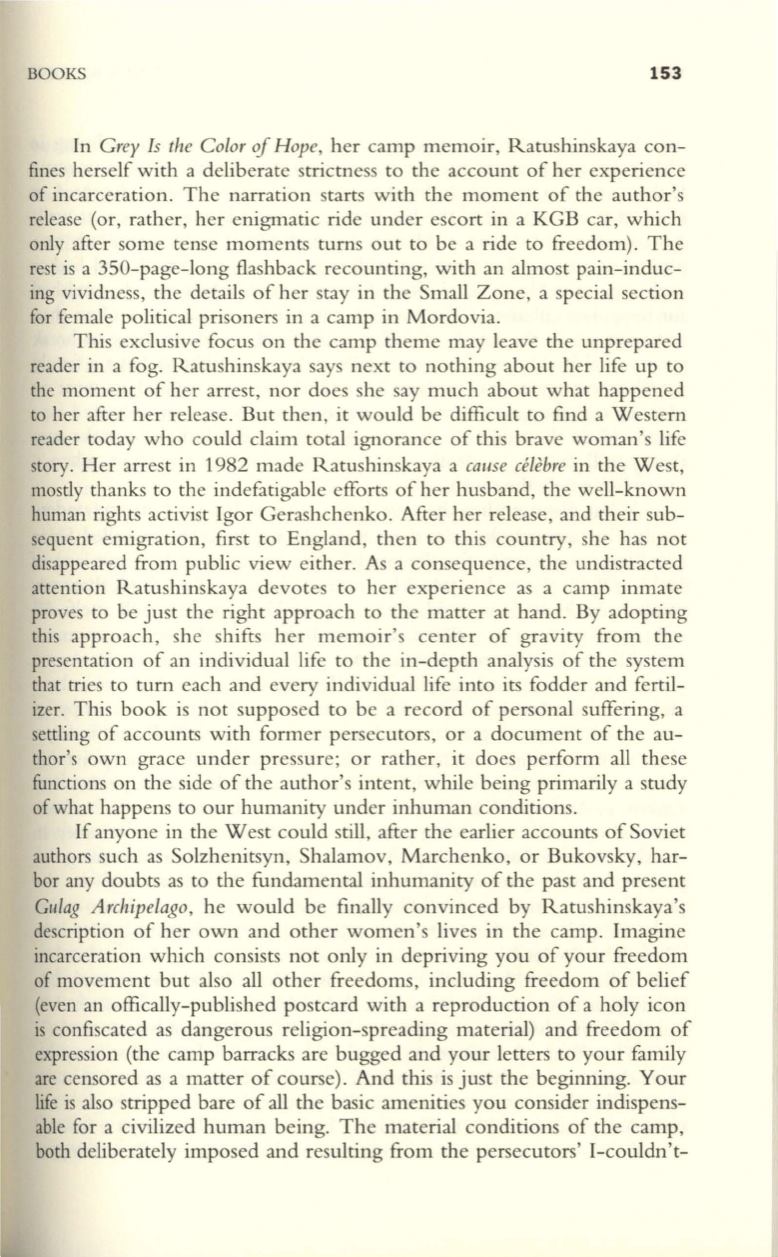
BOOKS
153
In
Grey Is the Color
if
Hope,
her camp memoir, Ratushinskaya con–
fines herself with a deliberate strictness to the account of her experience
of incarceration. The narration starts with the moment of the author's
release (or, rather, her enigmatic ride under escort in a KGB car, which
only after some tense moments turns out to be a ride to freedom). The
rest is a 350-page-Iong flashback recounting, with an almost pain-induc–
ing vividness, the details of her stay in the Small Zone, a special section
for female political prisoners in a camp in Mordovia.
This exclusive focus on the camp theme may leave the unprepared
reader in a fog. Ratushinskaya says next to nothing about her life up to
the moment of her arrest, nor does she say much about what happened
to
her after her release. But then, it would be difficult to find a Western
reader today who could claim total ignorance of this brave woman's life
story. Her arrest in 1982 made Ratushinskaya a
ca~lse
celebre
in the West,
mostly thanks to the indefatigable efforts of her husband, the well-known
human rights activist Igor Gerashchenko. After her release, and their sub–
sequent emigration, first to England, then to this country, she has not
disappeared from public view either. As a consequence, the undistracted
attention Ratushinskaya devotes to her experience as a camp inmate
proves to be just the right approach to the matter at hand. By adopting
this approach, she shifts her memoir's center of gravity from the
presentation of an individual life to the in-depth analysis of the system
that tries to turn each and every individual life into its fodder and fertil–
izer. This book is not supposed to be a record of personal suffering, a
settling of accounts with former persecutors, or a document of the au–
thor's own grace under pressure; or rather, it does perform all these
functions on the side of the author's intent, while being primarily a study
of what happens to our humanity under inhuman conditions.
lfanyone in the West could still, after the earlier accounts of Soviet
authors such as Solzhenitsyn, Shalamov, Marchenko, or Bukovsky, har–
bor any doubts as to the fundamental inhumanity of the past and present
Gulag Archipelago,
he would be finally convinced by Ratushinskaya's
description of her own and other women's lives in the camp. Imagine
incarceration which consists not only in depriving you of your freedom
of movement but also all other freedoms, including freedom of belief
(even an offically-published postcard with a reproduction of a holy icon
is confiscated as dangerous religion-spreading material) and freedom of
expression (the camp barracks are bugged and your letters to your family
are censored as a matter of course). And this is just the beginning. Your
life is also stripped bare of
all
the basic amenities you consider indispens–
able for a civilized human being. The material conditions of the camp,
both deliberately imposed and resulting from the persecutors' I-couldn't-


